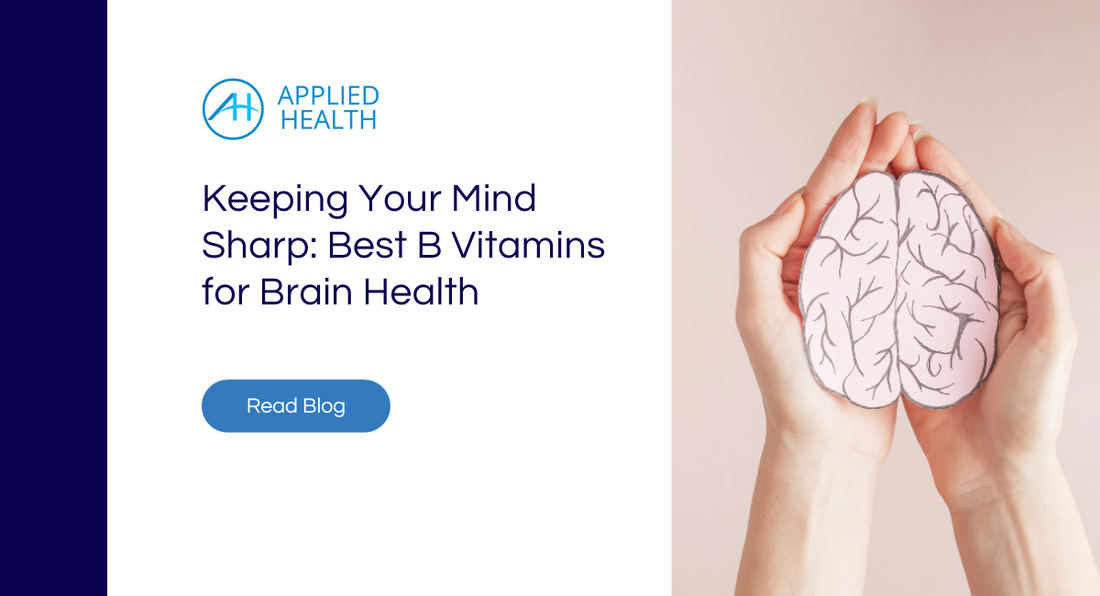Keeping our brains healthy is not just about crossword puzzles and eating your greens (though they do help). It is also about essential nutrition, including the best B vitamins for brain health.
A healthy diet and getting the right vitamins may be the secret sauce to clearer thinking and cognitive performance. If you have been wondering which nutrients come out on top in supporting your noggin', you have come to the right place.
Many vitamins benefit a healthy brain, but if you need to prioritize your nutritional regimen this group of vitamins is a crucial place to start.
Let's dive into which B's are the best B vitamins for brain health. You will also see how these essential B's have a big impact on overall well-being.
Table Of Contents:
- The Importance of B Vitamins for Brain Health
- The Crucial Role of Vitamin B1 (Thiamin)
- The Vital Function of Vitamin B2 (Riboflavin)
- Vitamin B3 (Niacin) and Brain Health
- Vitamin B5 (Pantothenic Acid) and Brain Health
- The Vital Role of Folate in Brain Function
- The Importance of Vitamin B12 (Cobalamin)
- FAQs: Best B Vitamins for Brain Health
- Conclusion
The Importance of B Vitamins for Brain Health
B vitamins play a crucial role not only in protecting the brain from cognitive decline but are essential to your body's production of energy, hormones, healthy skin, and overall well-being. There are 8 different B vitamins with their own primary benefits. A deficiency in some of these vital nutrients can have a negative impact on the brain — like low mood, memory issues, or cognitive decline.
Let's take a closer look at B vitamin needs for brain performance.
The Crucial Role of Vitamin B1 (Thiamin)
Thiamin isn't a vitamin that sits on the sidelines — it contributes to the basic function of cells and helps metabolize nutrients for energy. This ensures everything runs smoothly behind the scenes so that your brain can perform at its best.
A deficiency in vitamin B1 can cause cognitive and neurological conditions that can turn into more severe issues — like Beriberi or Wernicke-Korsakoff syndrome.
The Vital Function of Vitamin B2 (Riboflavin)
Moving on to riboflavin which plays an equally important role in our bodies. This B vitamin assists enzymes with important reactions like producing red blood cells and breaking down fats and carbohydrates into energy.
It also has crucial antioxidant properties that are important to the function of healthy cells in the body. Low levels of riboflavin along with low levels of folic acid have been connected to weakened cognitive performance among older individuals.
Vitamin B3 (Niacin) and Brain Health
Let's talk about an all-star of the vitamin world, Vitamin B3 or niacin. For starters, it is a team player working with enzymes in our body.
This helpful B vitamin produces energy by helping to convert carbohydrates into glucose. Not only that, but niacin assists in creating essential fats and certain amino acids.
The brain also relies on niacin for energy and to function properly. Studies have indicated that brain fog and poor cognition have been connected to a niacin deficiency.
Niacin: The Anti-Inflammatory Powerhouse
Inflammation is like an unwelcome guest at a party, causing problems where there shouldn’t be. Niacin refuses to put up with it and steps in to help reduce inflammation, allowing your body systems to run more smoothly.
How does niacin have these incredible inflammatory-fighting powers?
If we were writing an action movie script for niacin’s life story (which sounds thrilling), prostaglandins would be the villain. Prostaglandins are molecules in our body that promote inflammation.
Niacin works to counteract prostaglandins by blocking the enzyme COX-2 to curtail inflammation. This process is all about limiting harmful free radicals in your body.
Vitamin B5 (Pantothenic Acid) and Brain Health
Let's take a look at this next rockstar of B vitamins, pantothenic acid, also known as vitamin B5. It doesn't just have a fancy name; it does impressive stuff for your brain too.
Pantothenic acid helps in breaking down fatty acids for energy production and helps your brain cells function optimally.
Understanding Vitamin B6 (Pyridoxine)
Moving on from pantothenic acid let's shift to pyridoxine, or vitamin B6. Pyridoxine can support immune function and be a promoter of mental health.
Recent research has shown it helps to synthesize vital neurotransmitters like serotonin and norepinephrine which regulate emotions.
A vitamin B6 deficiency has been linked to inflammatory conditions and low levels of this nutrient may also have a negative impact on brain development.
The Role of Vitamin B7 (Biotin) in Cell Communication
Up next, we have biotin – or if you want to use its formal title: vitamin B7. Not only is this guy essential to healthy hair, skin, and nails but it plays an important role in cellular communication.

Biotin acts like a switchboard operator regulating cell signals throughout your body, including your brain. This efficient communication helps your body run smoothly, from boosting metabolism to maintaining a healthy nervous system.
The Vital Role of Folate in Brain Function
Folate, also known as Vitamin B9, is a powerhouse when it comes to neurological health. Its brain benefits are multifold — from promoting neurotransmitter activity and cellular detoxification.
This vitamin helps create and repair DNA - essentially keeping your mental engine well-oiled.
Think of it like high-grade motor oil for an expensive sports car. Much like that pricey automobile, your brain needs consistent upkeep to stay at its peak and these B vitamins play a significant role in that maintenance.
Folate & Mood Support
Folate also helps the production of neurotransmitters such as serotonin and dopamine. These chemicals act like messengers relaying signals between nerve cells helping to support your mental health.
Aiding Cellular Detoxification
Last but certainly not least in folate’s list of accomplishments is its role in cellular detoxification. Yes indeed.
Folate does more than fuel cell growth—it actually helps clean house by assisting liver enzymes responsible for detoxifying harmful substances.
So, think of folate as a hardworking janitor tirelessly cleaning up the mess left behind by daily metabolic processes. With less toxic waste cluttering your cells, they can work more efficiently.
The Importance of Vitamin B12 (Cobalamin)
It would be a big oversight if we didn't talk about another major player. That is Cobalamin, but you might know it better as Vitamin B12.
Vitamin B12 plays a critical role in red blood cell formation, DNA synthesis, nervous system development, supporting brain health, and cardiovascular function. Your cognitive function can take a hit if you're not getting enough of this crucial vitamin — poor memory is one such sign.
Elderly People are at Higher Risk
As we age, our ability to absorb certain nutrients declines – with Vitamin B12 being one prime example. This is especially true for those living on their own who might find cooking nutritious meals burdensome or challenging.
An unbalanced diet lacking vital nutrients, like cobalamin, could lead to various physical symptoms and even mental health issues like depression and dementia.
Vitamins Play Key Role: It's More Than Just Diet
While it’s important to eat a balanced diet rich in Vitamin B12, the reality is that many elderly individuals might need more help. This could be due to decreased appetite or difficulty in preparing nutritious meals.
It's essential to find a high-quality B vitamin supplement that supplies the recommended daily allowance. But remember, not every bottle from the store will do the trick. It's crucial to find one that gives you the best B vitamins for brain health that are easily absorbed.
Complex B Vitamins (Easy-Tummy Formula) includes the active forms of not only vitamin B12 but all eight B group vitamins. This ensures better absorption and benefits for your brain and body.
FAQs: Best B Vitamins for Brain Health
Is it better to take B12 or B complex?
If you're not deficient in any specific type of vitamin B, a balanced intake through a good quality Vitamin B Complex can be optimal.
Which are the best B vitamins for brain health?
Vitamin B6, B9 (folate), and B12 (cobalamin) are particularly vital to healthy cognition. They aid in the formation of neurotransmitters, cell detoxification, and DNA synthesis.
What other vitamins should I take to support a healthy brain?
Apart from the beneficial effects of certain B vitamins on cognition, adequate amounts of Vitamins C and E that offer antioxidant protection also contribute significantly towards maintaining healthy brains.
Conclusion
Although we may not consciously consider the eight "B's", these essential vitamins contribute to a lot of work behind the scenes. Each offers unique benefits — fighting inflammation, increasing energy, supporting cellular communication, or aiding metabolism.
So is one B vitamin more important than another for your cognition? Nope, as we discovered all eight of these are the best B vitamins for brain health!
Remember though, a vitamin deficiency in any of these B's may lead to a decrease in brain cell function, cognitive issues, or neurodegenerative diseases. So, let's prioritize getting enough through diet and a B Complex vitamin supplement that contains active forms of these crucial nutrients.

